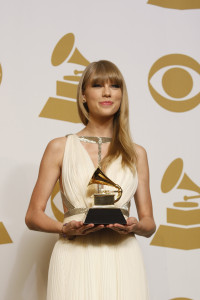
“There’s a special place in hell for women who don’t help other women,” Taylor Swift said in a recent Vanity Fair interview. If you have been living under a rock, you might assume Swift was referring to some serious girl-on-girl crime, perhaps bullying or gossip.
In fact, she was criticizing Amy Poehler and Tina Fey, who briefly joked at this year’s Golden Globes that Taylor Swift should “stay away from Michael J. Fox’s son.”
Given that Poehler and Fey are nearly universally adored, especially online, Taylor Swift’s comment has sparked a significant degree of backlash. Many of the responses took form in predictable tweets and Facebook statuses: “She can dish it out in her songs but she can’t take it”–“She needs thicker skin to survive in Hollywood…” “The joke wasn’t even that offensive.” However, many took to Tumblr, Gawker and Buzzfeed to point out that Poehler has a popular web series designed to give girls advice, and Tina Fey, as one of today’s preeminent female comedy writers, has make huge strides for women in the entertainment industry. For Swift to insinuate Poehler and Fey don’t “help women,” especially given that most of Taylor’s songs are about being hung up on boyfriends, was a claim that the Internet ripped apart with glee.

However, Amy and Tina’s responses have been much more levelheaded. Fey seemed shocked that of all the jokes she made at the Golden Globes, this was the one that received any backlash.
“If anyone was going to get mad at us, I thought it would be James Cameron. I did not see that one coming,” she has said, referencing a jibe about trusting the woman who used to be married to Cameron to make a good film about torture.
Meanwhile, Amy Poehler was more glib.
“I feel bad if she was upset. I am a feminist, and she is a young and talented girl. That being said, I do agree I am going to hell. But for other reasons. Mostly boring tax stuff,” Poehler has stated.
Now that Fey and Poehler have responded and Swift has let their statements sit, the feud will likely die down (though I am looking forward to the song that Swift will inevitably write about this). However, this mini-feud illustrates how Internet culture is like steroids for celebrity gossip. Five years ago, this feud would have played out in publicist-crafted magazine quotes and Entertainment Tonight sound bites. However, in 2013, Taylor Swift’s original comment and Fey and Poehler’s responses have been shared on Facebook, re-tweeted, made into GIFs, shared some more, blogged about, commented on, remixed and mashed up with screaming goat noises. What might have been a low-key water-cooler conversation has turned into a feud we can actively perpetuate via social media.
A similar effect is at play with Anne Hathaway. While in 2012 she was making waves with her turn as Catwoman in “The Dark Knight Rises”–even President Obama remarked she was the best part of the film–by awards season 2013, she was a punch line on the Internet. What exactly she did to win the Internet’s universal derision is unclear–many point to her campaign to win Academy Award for Best Supporting Actress, which included revealing her dramatic weight loss for Les Miserables, endless magazine photo shoots and interview after interview in which quote after quote was picked apart and mocked. That culminated on Oscar night when she gave an awkward acceptance speech that included cradling her Oscar like a baby and whispering it, not to mention making all the worst-dressed lists with her strangely-cut pink Prada number.
But what really did Hathaway in, in terms of public image, was her inability to translate to social media. Even though she gave two of the best acting performances of 2012, her overly enthusiastic public presence and untraditional beauty make her an easy target for online critics from Twitter to Jezebel. Meanwhile, fellow Oscar-winner Jennifer Lawrence, with her self-deprecating sense of humor, unpretentious attitude and GIF-ready expressions has managed to make herself incredibly well-liked.
So what does this mean? In this new decade, celebrities have to be extra-conscious of every word, sound bite and expression. And we, formerly the audience, have the power to directly mold the public image of celebrities–one tweet or goat video at a time.